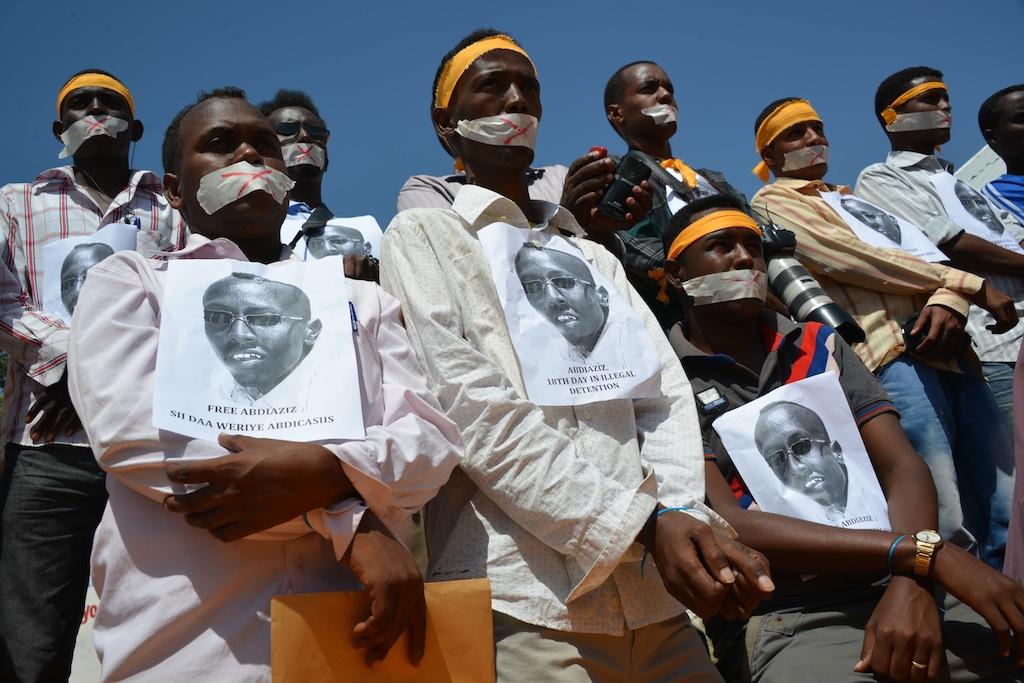Sexual assault victims and journalists scared into silence in Somalia
Somali journalists simulate being handcuffed and hold up pictures of their arrested colleague, Abdiaziz Abdinor Ibrahim, condemning his long term in jail on January, 27, 2013 in Mogadishu.
Activists anticipate that the recent jailing of a displaced rape victim and journalist Abdiaziz Abdinur will a impose a reign of terror on Somalian journalists and victims of sexual violence.
According to the New York Times, local residents report that 27-year-old Luul Ali Osman was getting food for her family when a band of national security officers forced her into an abandoned police station at gunpoint and proceeded to assault her. Last month Somali authorities arrested her, along with journalist Abdiaziz Abdinur and three individuals linked to the case.
Osman is from an internally displaced-persons (IDP) camp in Mogadishu, where accounts of sexual violence against women are rampant and frequently silenced.
“In Somalia there is a culture of denial, silence and stigma when it comes to rape,” UN representative Zainab Hawa Bangura explained to Reuters, describing why international rights groups “often depend on journalists to help” when surveying communities.
Between the months of September and December 2012, the UN registered over 800 rape cases in the Mogadishu camps, and approximately 10 journalist deaths. Reluctance to speak out against injustice is perpetuated by a pervasive fear of arbitrary arrests and detentions.
“These crimes are underreported because of risks to victims, witnesses and family members,” Secretary-General Ban Kin moon said in a statement on Wednesday. “It takes extraordinary courage for survivors to come forward.”
Luul Ali Osman’s arrest followed a recent increase in media attention surrounding incidents of sexual abuse by security forces. The Central Investigation Department (CID) learned her story was featured on a Somali news station, and was allegedly linked to an article by Al Jareeza about allegations of sexual violence in the Mogadishu region.
After two days of interrogations she was convicted of offending the honor of state government, inducing false evidence, fabricating a criminal offense, and making a false accusation to receive financial gain from allegations, reported the Associated Press. Osman's year-long sentence was deferred until after her infant is finished breastfeeding; but police detained her husband and two acquaintances responsible for introducing Osman to media contacts.
Amnesty International reports that the head General of the CID used Osman’s cell phone to reach Abdiaziz Abdinur, a freelance journalist who had spoken with Osman about her alleged rape. In spite of never having published the interview, Abdiaziz Abdinur was also convicted of filing a false report and offending the honor of state government.
Osman and Abdinur both intend to appeal the charges.
More from GlobalPost: Somalia woman charged after alleging rape by security forces
International rights groups and journalists have attracted widespread attention to the trial through press releases and demonstrations, propagating the case as “politically motivated.” The National Union of Somali Journalists (NYSOJ) also denounced the case as an attack on press freedom that creates a “mockery of the legal process in Somalia.”
A joint statement issued by Human Rights Watch, Amnesty International and the Committee to Protect Journalists (CPJ) calls for the immediate release of the four detainees, and a full investigation into the allegations of sexual violence. Osman’s husband and the two detainees have since been acquitted due to lack of supporting evidence, says Reuters. Adbiaziz Abdinur is currently detained at Mogadishu Central Prison.
For leaders abroad, the recent election of Hassan Sheik Mohamud in September has signified Somalia’s hopeful emergence from a long era of war-torn instability. But on the ground, activists remain skeptical of the new government’s commitment to maintain media freedom, respect for human rights, and a fair judicial process.
More from GlobalPost: Record number of journalists killed worldwide in 2012
The trial came at an inconvenient time for the newly elected leader, who was traveling abroad collecting donations to rebuild Somalia. Hiiraan News reports that while in Washington, Mohamed assured the Center for Strategic and International Studies that he had had no intention of intervening in the judicial process of this case.
“It is a test for how we fulfill the rule of law in Somalia. We believe that no one is above the law," he said.
Daniel Bekele, Africa director at HRW, acknowledges the new government has been “saying the right things about the rule of law and a free press, but locking up journalists and others who report rape sends the opposite message.”
From the Dalsan radio station, where Adbiaziz Abdinur worked as a reporter, Al Jareeza conveys the trial's sobering effect on coworkers. Some, like Mohamed Dahir, consider transitioning from “rape cases and corruption cases” to tamer stories that won't attract attention upstairs. Many others like Hassan Ali Geesay, who perceive “the risks are too great now,” will stop coming to work altogether.
Bekele demands that President Hassan Sheikh Mohamed “honor his commitment by making sure the police handling of this case doesn’t discourage journalists from reporting government abuses or victims from seeking justice.”
We want to hear your feedback so we can keep improving our website, theworld.org. Please fill out this quick survey and let us know your thoughts (your answers will be anonymous). Thanks for your time!
